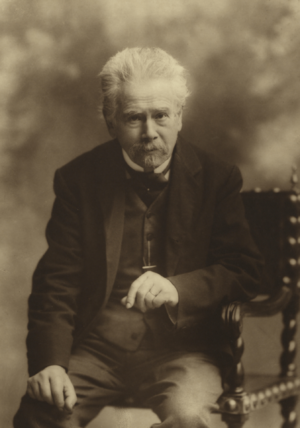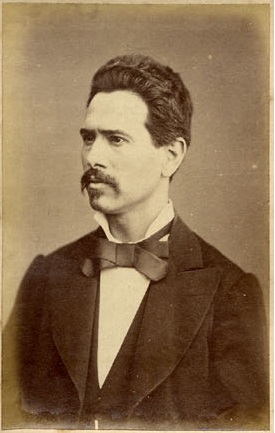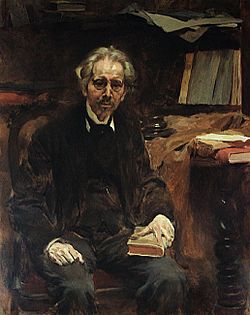Teófilo Braga facts for kids
Quick facts for kids
Teófilo Braga
|
|
|---|---|

Braga in 1915
|
|
| President of Portugal | |
| In office 29 May 1915 – 5 October 1915 |
|
| Prime Minister | José de Castro |
| Preceded by | Manuel de Arriaga |
| Succeeded by | Bernardino Machado |
| President of the Provisional Government | |
| In office 5 October 1910 – 4 September 1911 |
|
| Preceded by | Manuel II (Monarch) António Teixeira de Sousa (Prime Minister) |
| Succeeded by | Manuel de Arriaga (President) João Chagas (Prime Minister) |
| Personal details | |
| Born |
Joaquim Teófilo Fernandes Braga
24 February 1843 Ponta Delgada, Azores, Portugal |
| Died | 28 January 1924 (aged 80) Lisbon, Portugal |
| Political party | Portuguese Republican (until 1911) Democratic (from 1911) |
| Spouse |
Maria do Carmo Xavier
(m. 1868; died 1911) |
| Children | 3 |
| Alma mater | University of Coimbra |
| Signature | |
Joaquim Teófilo Fernandes Braga (born February 24, 1843 – died January 28, 1924) was a famous Portuguese writer, playwright, and politician. He played a very important role in Portugal's history.
Braga led the first government after Portugal stopped being a monarchy and became a republic. This happened when King Manuel II was overthrown. Later, he also became the second elected president of the First Portuguese Republic. He took over after the first president, Manuel de Arriaga, resigned.
Teófilo Braga's Early Life
Teófilo Braga was born in Ponta Delgada, a city in the Azores islands. His family had connections to important people in Portuguese history. His father, Joaquim Manuel Fernandes Braga, was a military officer who later became a teacher. His mother was Maria José da Câmara e Albuquerque.
Teófilo was the youngest of seven children. Sadly, three of his siblings died when they were very young. His mother also passed away when he was only three years old. His father remarried, but Teófilo did not get along well with his stepmother.
A Young Writer's Start
To escape his difficult home life, Teófilo found comfort in books. He spent a lot of time at the public library in Ponta Delgada. He also visited the home of the Viscount of Praia, where his father taught.
When he was just 15, in 1859, he published his first book of poems. It was called Folhas Verdes (which means "Green Leaves"). This book was inspired by another famous Portuguese author, Almeida Garrett.
Teófilo was a strong-willed and determined young man. He even got into trouble at school for speaking his mind to a teacher. After finishing secondary school, he wanted to travel to America. However, his father encouraged him to study at the University of Coimbra instead.
In April 1861, Teófilo Braga arrived in Coimbra. He hoped to study Theology or Law. After a year of preparation, he joined the Law Faculty at the university.
University Life and Literary Debates
Life as a university student was simple and focused for Teófilo. He preferred to study hard rather than join in the usual student fun. A writer from his time, Ramalho Ortigão, described him as someone who loved learning above all else. He said Teófilo was always writing and full of ideas.
While at Coimbra, Teófilo became involved in literary discussions. He joined a group of artists and writers who had new ideas. This group was part of what was called Questão Coimbra (the "Coimbra Question") around 1865.
The Coimbra Question
Teófilo wrote many of his early works during this time. He published a poem called Visão dos Tempos (meaning "Vision of the Times") in 1864. This work was well-received by many, including the respected author António Feliciano de Castilho.
However, his next book of poetry, Tempestades Sonoras, was not as popular. It had a difficult philosophical introduction. Castilho and his followers were very traditional. They criticized Teófilo and his friend Antero de Quental for their modern ideas.
This led to a big literary "fight" known as the Questão Coimbrã. Many Portuguese writers took part in this debate. Teófilo Braga wrote a strong piece called As Teocracias Literárias (meaning "The Literary Theocracy"). This period showed Teófilo's strong belief in new ideas over old traditions.
Personal Tragedies
In April 1868, Teófilo Braga married Maria do Carmo Xavier. She came from a wealthy family. Sadly, their life together was marked by great sadness. All three of their children died young: Joaquim (1869), Teófilo (1886), and Maria da Graça (1887).
Maria do Carmo was heartbroken by these losses. Her health was always delicate, and she passed away in 1911. Even Camilo Castelo Branco, a writer who was usually an enemy of Braga, felt sympathy for him during this time.
Despite these personal difficulties, Teófilo Braga continued his studies. In 1872, he earned his law degree. He then became a professor of modern literature at the University of Coimbra.
Teófilo Braga's Ideas and Writings
Teófilo Braga wanted to be a deep thinker and a theorist. He was very interested in a philosophy called Positivism. This way of thinking focuses on scientific evidence and logical reasoning. He was influenced by thinkers like Auguste Comte.
Between 1878 and 1882, he helped start a magazine called O Positivismo. He also wrote books like Traços Gerais de Filosofia Positiva (1877) and Sistema de Sociologia (1884).
A Dedicated Scholar
As a professor, Teófilo Braga was very dedicated to his work. He spent most of his time studying and writing. He lived a simple life, often staying at home in his library.
He wrote a huge work called História da Literatura Portuguesa (meaning "History of Portuguese Literature"). He also became interested in folklore and traditional stories. He published books like História da Poesia Popular Portuguesa (1867) and Contos Tradicionais do Povo Português (1883).
Positivism and Politics
Teófilo Braga's positivist ideas also shaped his political views. He believed that Portugal should become a republic. For him, a republic was not just a change in government. It was about freeing people from old ways of thinking.
At the time, the Roman Catholic Church had a lot of power in Portugal. Republicans like Braga believed that people were too controlled by the Church. They wanted a society based on reason and modern ideas.
Braga strongly supported the idea of a republic. He believed in giving power to the people and in public education. He wrote many articles and books to spread these ideas. Some of his political works include História das Ideias Republicanas em Portugal (1880) and Dissolução do Sistema Monárquico-Representativo (1881).
He was also involved in many republican groups and events. In 1880, he helped organize celebrations for the 300th anniversary of the death of Luís de Camões, a famous Portuguese writer.
Teófilo Braga's Political Career
Braga became active in Portuguese politics in 1878. He ran for a position as a republican representative. Over the years, he held many important roles in the Portuguese Republican Party.
He was involved in a republican revolt in Oporto in 1891. Although the revolt failed, Teófilo Braga continued to be a strong voice for the republican cause. He worked hard to spread republican ideas and gain support.
The Rise of the Republic
The political situation in Portugal became very unstable in the late 1800s and early 1900s. There was a lot of disagreement among the ruling parties. This led to a period of crisis.
The republican movement grew stronger during this time. Groups like the Republican Party, freemasons, and other idealists worked together. They wanted to end the monarchy and create a republic.
On January 1, 1910, Teófilo Braga became a key member of the Republican Party's leadership. On August 28, 1910, he was elected as a representative for Lisbon.
The revolution began on October 4, 1910. The next day, Teófilo Braga was named the President of the Provisional Government of the Portuguese Republic. This was a huge moment for Portugal, as it marked the end of the monarchy.
President of Portugal
After the Republic was established, the old Republican Party split into new groups. Teófilo Braga was closely connected to the "Democrats" faction.
He returned to government in May 1915. He became the President of the Republic after the first president, Manuel de Arriaga, resigned. Arriaga had supported a military dictatorship, which was later defeated. Braga was then elected to lead the country.
Later Life and Legacy
Teófilo Braga was a very simple and humble man. After his wife passed away, he became quite reclusive. He spent most of his time in his library. Even as president, he lived modestly. He often walked everywhere with his umbrella or cane.
He was a solitary figure, having lost many loved ones throughout his life. His mother died young, his father died in the Azores, and all his children and his beloved wife passed away before him. He also lost his sight later in life.
Teófilo Braga died at the age of 80 on January 28, 1924. In his will, he asked for a simple, non-religious burial. He was buried in the Jerónimos Monastery in Belém, Lisbon.
Historians remember Teófilo Braga as a very knowledgeable and important author. His many books on literature, history, and philosophy are still studied today.
Teófilo Braga's Published Works
Teófilo Braga wrote many books across different subjects. He wrote about the history of literature, folklore, poetry, fiction, and philosophy.
Poetry
- Visão dos Tempos (1864)
- Tempestades Sonoras (1864)
- Torrentes (1869)
- Miragens Seculares (1884)
- Poesia do Direito (1865)
Fiction
- Contos Fantásticos (1865)
- Viriato (1904)
Essays and History
- As Teorias Literárias – Relance sobre o Estado Actual da Literatura Portuguesa (1865)
- História da Poesia Moderna em Portugal (1869)
- História da Literatura Portuguese (Introdução) (1870)
- História do Teatro Português (1870–1871) – 4 volumes
- Teoria da História da Literatura Portuguesa (1872)
- Manual da História da Literatura Portuguesa (1875)
- Bocage, sua Vida e Época (1877)
- Parnaso Português Moderno (1877)
- Traços gerais da Filosofia Positiva (1877)
- História do Romantismo em Portugal (1880)
- Sistema de Sociologia (1884)
- Camões e o Sentimento Nacional (1891)
- As Lendas Christãs (1892)
- História da Universidade de Coimbra (1891–1902) – 4 volumes
- História da Literatura Portuguesa (1909–1918) – 4 volumes
Anthologies and Research
- Antologias: Cancioneiro Popular (1867)
- Contos Tradicionais do Povo Português (1883)
See also
 In Spanish: Teófilo Braga para niños
In Spanish: Teófilo Braga para niños
- List of presidents of Portugal
- List of prime ministers of Portugal
- Portuguese First Republic
- History of Portugal
- Timeline of Portuguese history
- Politics of Portugal
- Culture of Portugal
 | May Edward Chinn |
 | Rebecca Cole |
 | Alexa Canady |
 | Dorothy Lavinia Brown |



